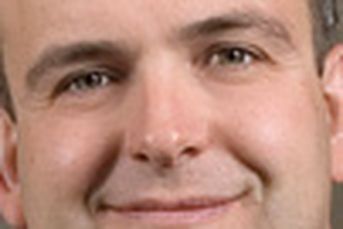Stifel backs off recruiting wars — and profits soar
Earnings up 80% in 1Q, even though recruitment dipped substantially; 'people dangling money'
Stifel Financial Corp., which last year absorbed 56 retail branches and more than 300 advisers from UBS Financial Services Inc.’s wealth management group, said first-quarter profit soared 80% from a year earlier — even as it slowed its efforts to recruit new brokers.
Almost 64% of Stifel’s revenue and 57% of its operating profit came from its global wealth management group in the quarter that ended March 31.
The firm’s financial adviser roster, however, saw the addition of only 45 names — to 1,900 — as it refrained from recruiting wars with larger firms. In 2009, the company added more than 500 advisers.
Instead of bulking up on advisers, Stifel appears to be focused on expanding investment banking to create a more balanced mix of revenue. “The market is very heated, and we’re not going to participate if it doesn’t make sense,” Stifel Chairman and chief executive Ron Kruszewski said in a conference call with analysts. “The [wirehouses] have really kicked up their recruiting packages to levels where we don’t want to play.”
Big firms are lassoing high-producing brokers to rebuild their reputations with clients and investors after the stunning losses they absorbed in the 2008 credit meltdowns, Mr. Kruszewski said. “There is nothing I can do about people dangling money around,” he added.
Companies such as Morgan Stanley Smith Barney LLC and Bank of America’s Merrill Lynch unit have been offering top brokers as much as 300% of the revenue they produced in the previous 12 months, while at the same time winnowing the ranks of their low producers.
This week, LPL Financial, the independent-contractor brokerage firm that had been intensively recruiting wirehouse brokers, said its first-quarter recruiting plummeted after a torrid pace in 2009.
Stifel, which offers advisory services through it Stifel Nicolaus & Co. Inc. broker-dealer, along with and its Century Securities Associates Inc. unit for independent contractors, this week announced it is merging with Thomas Weisel Partners Group Inc. in a deal valued at $300 million.
The deal will help Stifel Financial bring its mix of retail and investment-banking/capital revenue closer to a 50-50 mix, said Mr. Kruszewski. Weisel specializes in technology, health care and energy banking for midsize companies.
Stifel Financial reported first-quarter net income of $24 million, or 68 cents per diluted share, an 80% increase over last year’s first quarter but down 4% from its record fourth quarter of 2009. Operating income in global wealth management more than doubled from a year earlier to $36.9 million, compared with a 5% jump in the institutional sector’s operating income to $27.5 million.
Mr. Kruszewski said the firm’s retail investors have embraced the rising stock markets and are getting even more involved. “Despite all the challenges we have in the country,” he said, “we’ve had good flows, good activity, [and] and the private-client investor is engaged.”
He estimated that the former UBS brokers who joined Stifel are operating at about 80% of their potential. Many came in the latter half of 2009, and it can take six to seven months for them to transfer all their clients assets and reach full operational efficiency, he said.
Stifel ended the first quarter with 1,900 financial advisers in all its brokerage channels and 4,518 full-time associates, up 36.3% and 26.9%, respectively, from a year earlier. But that’s still an increase of less 1% for advisers and 2% for associates since the end of 2009. Its 294 brokerage offices were up 28% from a year earlier and flat with the end of last year, while total client assets grew 73.8% from a year earlier and 4.4% in the first quarter to $95.3 billion.
Mr. Kruszewski, who has been active in the Securities Industry and Financial Markets Association’s lobbying activities on financial reform, said he’s sanguine about probable legislation, despite some concerns about imposition of a highly restrictive fiduciary standard. “Our brokers do act in their clients’ interest first,” he said, and it would be “ridiculous” to tell them that under the Investment Advisers Act of 1940, they wouldn’t be able to do things such as sell municipal bonds that the firm underwrites. “I think that cooler heads will prevail” in Congress, he said.
Learn more about reprints and licensing for this article.




